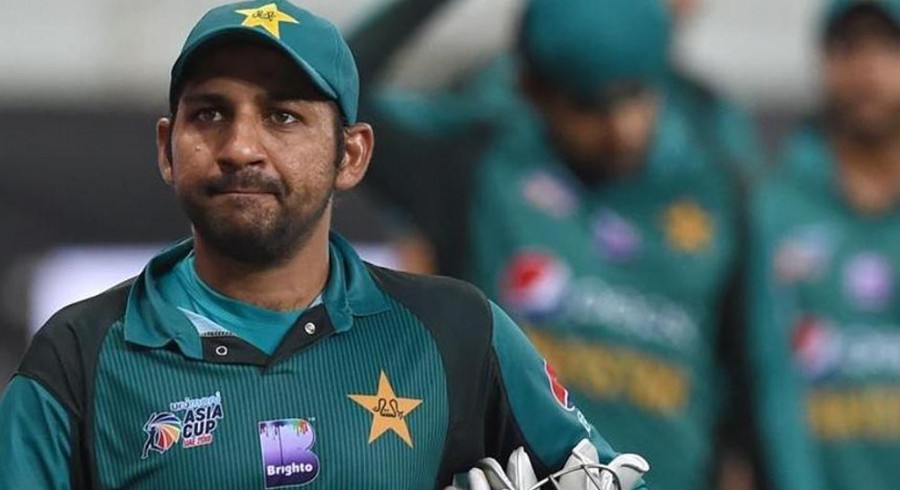The road to the mega event for the Men in Green this year has been paved with defeats
 PHOTO: AFP
PHOTO: AFP
The Pakistan cricket team is its own worst enemy. They have given their fans unexpected highs and have fallen to extreme lows. The road to the International Cricket Council (ICC) 2019 World Cup for Pakistan this year has been paved with defeats. They first got whitewashed in a home series against Australia and then lost a series four- nil to England away.
Their self-destructive capabilities have been well known throughout the ages. Here are three things that might cost Pakistan during the World Cup:
Bad Selection
All teams rely on long-term strategies, as far as team selection for an event like the World Cup is concerned. With a chief selector like the great Inzamamul Haq at the helm, we thought the same could be expected from Pakistan.
However that was found to be far from the truth. The first cracks appeared when management decided to rest most of Pakistan’s key players in a series against an Australian side that was fresh of an incredible come-from-behind series victory against India.
This decision resulted in a five-nil series loss at home which stripped the players of their confidence and added unnecessary pressure on management before the mega event.
A series loss to England did not help matters either as the squad that was selected was riddled with injuries and fitness issues.
The initial World Cup squad announcement sent out a clear message that mediocrity would not be tolerated. Fast-bowler Mohammad Amir and batsman Asif Ali were excluded from the squad.
The pair was told to earn their way back. The message was clear and refreshing for a Pakistan selection committee that has historically buckled under pressure.
Asif Ali grabbed his opportunity with both hands scoring two quick fifties in consecutive matches against the number-one side in the world.
Mohammad Amir however was not so lucky and came down with chicken pox. What should have been the end of his chances became an instant ‘get out of jail’ card as he has been added to the World Cup squad without featuring in a single match.
There is nothing inherently wrong with Amir’s selection. The problem lies in the selection committee’s inability to take decisive decisions and stick by them.
Their lacklustre strategies of resting key players before key series has stripped all the confidence from the team and created unnecessary pressure for the players. Their indecision has caused instability in Pakistan’s line-up which will end up costing Pakistan the World Cup.
The form of Sarfaraz Ahmed
It’s no secret that wicketkeeper and captain Sarfaraz continues to not only play but also captain the Pakistan team in the worst form of his career. He has been incapable of scoring big when given the chance. His 97-run innings in the final match against England was an aberration rather than a regular occurrence.
In most cases he comes down the order. His lack of power-hitting is on full display which dents Pakistan’s chances in every match.
It has come to a point where he has to hide himself behind non-full-time batsmen such as all-rounder Imad Wasim and fast-bowler Hasan Ali in crunch situations, when the team needs quick runs.
In an age where 300 is the new normal, teams cannot afford to have specialist keepers who do not add value to the batting line-up.
Sarfaraz to his credit is a great accumulator and the perfect batsman to build a solid foundation for power-hitters such as Mohammad Hafeez, Shoaib Malik and Asif Ali.
His insistence to bat down the order takes away his strength, which is finding gaps, and brings into focus his weakness which is power-hitting.
The simple remedy for this is for Sarfaraz to move up the order; however that seems unlikely and could prove problematic for Pakistan during the event.
Shoddy Fielding
Fielding has always been Pakistan’s Achilles heel. However in the past, individual performances were so strong that they over-shadowed the deficiencies in the fielding department.
Bowlers such as Shoaib Akhtar, Wasim Akram and Waqar Younis bowling in tandem did not require too much help from the fielders to win their side matches.
The current crop however is nowhere as experienced or skilful that they could destroy the opposition all on their own.
Pakistan’s only chance of having the upper hand against other teams in the World Cup lies in a united front, where bowlers can bowl tight lines and the fielders make sure to not spill chances and stop easy-runs to put pressure on the opposition.
As we saw in the England series such a fielding standard still eludes Pakistan. All the talk of fitness and better fielding led to one of the most lacklustre fielding performances. Pakistan was whitewashed by an England side that made Pakistan pay for every mistake.
The World Cup will feature teams who will be merciless as far as capitalising on fielding mistakes is concerned. If Pakistan doesn’t get its fielding act together, they will find it really hard to compete with other teams during the event.